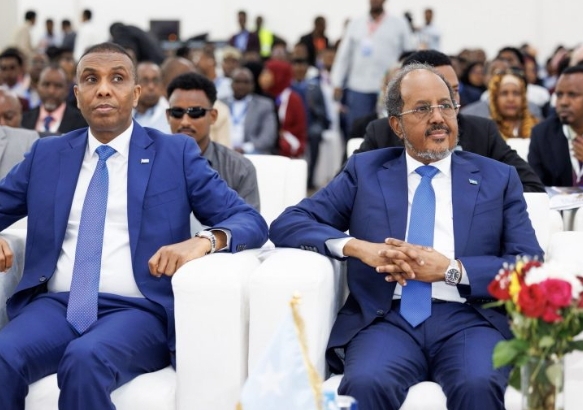Somalia has launched Centennial Vision 2060, a 35-year plan to become a stable, middle-income country. At the launch in Mogadishu, UN official Claver Gatete praised the move, comparing it to Rwanda’s recovery after the 1994 genocide. The plan aims to address insecurity, poor infrastructure, and unemployment, with a focus on strategic development and institutional reform.
Somalia launches Centennial Vision 2060 roadmap for 'peace, prosperity and progress


Somalia's President Hassan Sheikh Mohamud and Prime Minister Hamza Abdi Barre joined representatives from the United Nations in Mogadishu on Monday to officially launch Somalia’s Centennial Vision 2060. Described as a strategic framework for peace, prosperity, and progress, the vision aims to guide economic and institutional development that will transform Somalia into a stable, middle-income nation within the next 35 years.
Claver Gatete, Executive Secretary of the UN Economic and Social Commission for Africa (ECA), praised Somalia’s bold initiative. He addressed the forum, highlighting the global context: “We are convening today against the backdrop of a deeply uncertain world marked by climate volatility, geopolitical conflict, and economic instability. Africa, in particular, acutely feels these shocks. But what do nations do when faced with adversity?” Gatete asked.
“Some wait. Others forge ahead,” he continued. “Today, Somalia has chosen the latter approach – through its Centennial Vision 2060, the country is reclaiming its voice, rewriting its story, and reinventing its future with collective resolve.”
Gatete emphasized that the vision is not merely a document but a declaration of intent and determination by the Somali people. “This Vision is more than a policy document: it is a declaration of confidence, resilience, and ambition by the Somali people. As such, the ECA reaffirms its steadfast commitment to accompany Somalia, every step of the way on this journey. We will continue to share knowledge, amplify success stories, and deliver results that improve lives – with sustained collaboration, political will, and solidarity, Vision 2060 will not just be imagined; it will be realized.”
President Mohamud had announced in January 2023 that Somalia would formulate CV2060 to serve as a blueprint for all future development initiatives aimed at rebuilding the nation’s core institutions. This became necessary due to persistent institutional fragility, security concerns, and political complexities that have historically hindered Somalia’s economic recovery and reconstruction efforts.
According to the National Economic Council (NEC), the primary aim of the Vision is to craft a unified, long-term strategy that will drive the transformation of Somalia into a middle-income country with a capable government that can adequately serve its people by 2060. The NEC highlighted a range of urgent economic and social challenges, including state fragility, persistent insecurity in certain regions, poor infrastructure hampering economic activity, widespread food insecurity, environmental degradation, poor economic and social indicators, high unemployment, and issues of internal displacement and migration.
During his speech, Gatete referenced his home country, Rwanda, as a powerful example of what is achievable through resilience and vision. He spoke about the 1994 genocide against ethnic Tutsis, which resulted in the deaths of over a million people and devastated the nation’s social infrastructure. “Even before the genocide, infrastructure was rudimentary, access to quality education and health was limited, and economic productivity was stifled by a huge informal sector and aid dependency,” Gatete said.
“Afterward, the government embarked on a long journey to rebuild the country – from emergency response to reconstruction, reconciliation, and ultimately, sustainable development.” He noted that in under three decades, Rwanda had transformed into a model for post-conflict recovery in Africa, driven by a clear national vision, strategic discipline, and inclusive leadership.
“Rwanda’s success did not come from chance. It was the product of long-term strategic planning, institutional reform, and an unshakeable commitment to people-centred development. Somalia, too, possesses that same potential. So why not Somalia? And why not now?”
Gatete also pointed to the development progress seen in countries like Côte d’Ivoire and Mauritius. “The common thread in these examples is vision matched with discipline in execution. Thankfully, Somalia is not starting from zero, so I have no doubt that the country can also carve a similarly ambitious course and succeed,” he concluded.

 বাংলা
বাংলা  Spanish
Spanish  Arabic
Arabic  French
French  Chinese
Chinese 
